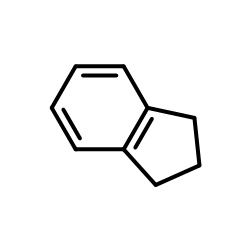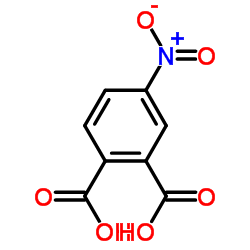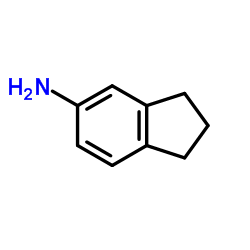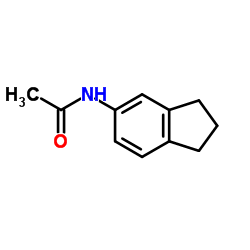7436-07-9
| 中文名 | 4-(5)-硝基茚满 |
|---|---|
| 英文名 | 5-nitro-2,3-dihydro-1H-indene |
| 中文别名 | 5-硝基茚满 |
| 英文别名 |
1H-Indene,2,3-dihydro-5-nitro
Indan,5-nitro 5-Nitroindane 4(5)-Nitroindan EINECS 231-088-0 5-Nitroindan 2,3-dihydro-5-nitro-1H-indene |
| 密度 | 1.251g/cm3 |
|---|---|
| 沸点 | 272.9ºC at 760 mmHg |
| 分子式 | C9H9NO2 |
| 分子量 | 163.17300 |
| 闪点 | 126.7ºC |
| 精确质量 | 163.06300 |
| PSA | 45.82000 |
| LogP | 2.60670 |
| 折射率 | 1.606 |
| 分子结构 | 1、 摩尔折射率:31.56 2、 摩尔体积(cm3/mol):93.4 3、 等张比容(90.2K):250.2 4、 表面张力(dyne/cm):51.4 5、 极化率(10-24cm3):12.51 |
Synonym: Section 2 - COMPOSITION, INFORMATION ON INGREDIENTS
Risk Phrases: Section 3 - HAZARDS IDENTIFICATION EMERGENCY OVERVIEW
Not available. Potential Health Effects The toxicological properties of this material have not been investigated. Use appropriate procedures to prevent opportunities for direct contact with the skin or eyes and to prevent inhalation. Section 4 - FIRST AID MEASURES Eyes: Immediately flush eyes with plenty of water for at least 15 minutes, occasionally lifting the upper and lower lids. Skin: Flush skin with plenty of soap and water for at least 15 minutes while removing contaminated clothing and shoes. Ingestion: Do NOT induce vomiting. Allow the victim to rinse his mouth and then to drink 2-4 cupfuls of water, and seek medical advice. Inhalation: Remove from exposure to fresh air immediately. Notes to Physician: Treat symptomatically and supportively. Section 5 - FIRE FIGHTING MEASURES General Information: As in any fire, wear a self-contained breathing apparatus in pressure-demand, MSHA/NIOSH (approved or equivalent), and full protective gear. During a fire, irritating and highly toxic gases may be generated by thermal decomposition or combustion. Extinguishing Media: In case of fire, use water, dry chemical, chemical foam, or alcohol-resistant foam. Autoignition Temperature: Not available. Flash Point: Not available. NFPA Rating: Not published. Explosion Limits, Lower: Not available. Upper: Not available. Section 6 - ACCIDENTAL RELEASE MEASURES General Information: Use proper personal protective equipment as indicated in Section 8. Spills/Leaks: Absorb spill with inert material, (e.g., dry sand or earth), then place into a chemical waste container. Clean up spills immediately, observing precautions in the Protective Equipment section. Section 7 - HANDLING and STORAGE Handling: Wash thoroughly after handling. Remove contaminated clothing and wash before reuse. Avoid contact with eyes, skin, and clothing. Avoid ingestion and inhalation. Storage: Store in a cool, dry place. Keep container closed when not in use. Section 8 - EXPOSURE CONTROLS, PERSONAL PROTECTION Engineering Controls: Use adequate general or local exhaust ventilation to keep airborne concentrations below the permissible exposure limits. Use process enclosure, local exhaust ventilation, or other engineering controls to control airborne levels. Personal Protective Equipment Eyes: Wear safety glasses and chemical goggles if splashing is possible. Skin: Wear appropriate protective gloves and clothing to prevent skin exposure. Clothing: Wear appropriate protective clothing to minimize contact with skin. Respirators: Wear a NIOSH/MSHA-approved (or equivalent) full-facepiece airline respirator in the positive pressure mode with emergency escape provisions. Section 9 - PHYSICAL AND CHEMICAL PROPERTIES Physical State: Not available. Appearance: brown green Odor: None reported. pH: Not available. Vapor Pressure: Not available. Vapor Density: Not available. Evaporation Rate: Not available. Viscosity: Not available. Boiling Point: @ 760.00mm Hg Freezing/Melting Point: 39.00 - 40.00 deg C Decomposition Temperature: Not available. Solubility: Not available. Specific Gravity/Density: Not available. Molecular Formula: C9H9NO2 Molecular Weight: 163.18 Section 10 - STABILITY AND REACTIVITY Chemical Stability: Stable under normal temperatures and pressures. Conditions to Avoid: Incompatible materials, strong oxidants. Incompatibilities with Other Materials: Not available. Hazardous Decomposition Products: Irritating and toxic fumes and gases. Hazardous Polymerization: Has not been reported. Section 11 - TOXICOLOGICAL INFORMATION RTECS#: CAS# 7436-07-9 unlisted. LD50/LC50: Not available. Carcinogenicity: 5-Nitroindan, 99% - Not listed by ACGIH, IARC, NIOSH, NTP, or OSHA. See actual entry in RTECS for complete information. Section 12 - ECOLOGICAL INFORMATION For further information, contact Fisher Scientific. Section 13 - DISPOSAL CONSIDERATIONS Dispose of in a manner consistent with federal, state, and local regulations. Section 14 - TRANSPORT INFORMATION CDG/CPL IMO Not regulated as a hazardous material. IATA Not regulated as a hazardous material. RID/ADR Not regulated as a hazardous material. Canadian TDG No information available. Section 15 - REGULATORY INFORMATION European/International Regulations European Labeling in Accordance with EC Directives Hazard Symbols: Not available. Risk Phrases: Safety Phrases: S 24/25 Avoid contact with skin and eyes. WGK (Water Danger/Protection) CAS# 7436-07-9: Canada None of the chemicals in this product are listed on the DSL/NDSL list. WHMIS: Not available. CAS# 7436-07-9 is not listed on Canada's Ingredient Disclosure List. Exposure Limits US FEDERAL TSCA CAS# 7436-07-9 is not listed on the TSCA inventory. It is for research and development use only. SECTION 16 - ADDITIONAL INFORMATION N/A |
|
~% 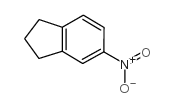
7436-07-9 |
| 文献:Arnold; Zaugg Journal of the American Chemical Society, 1941 , vol. 63, p. 1317,1318 Show Details Lindner; Schmitt; Zaunbauer Monatshefte fuer Chemie, 1939 , vol. 72, p. 216,220 |
|
~% 
7436-07-9 |
| 文献:Lindner; Bruhin Chemische Berichte, 1927 , vol. 60, p. 435 |
| 上游产品 1 | |
|---|---|
| 下游产品 5 | |

